The new papal encyclical, Laudato si’, is already a factor in the 2016 presidential election. Democrats are thrilled at having the “appearance” of support from Pope Francis. The Republican Party, which needs Catholic voters to win elections, should pay close attention to the impact of the encyclical on attitudes of Catholics previously skeptical of climate change enthusiasts.
Below, I attempt to describe the political dynamics set in play from now until election day that are primarily an attempt to distract Catholic voters from the importance of settled, non-negotiable Catholic moral teachings about life, marriage, and the family.
1. It should always be kept in mind that there are two encyclicals, the one written by the pope, and the other being reported by the media — they are not the same, not even close.
2. The media version of the encyclical is designed to benefit Democrats and hurt Republicans, specifically to drive a wedge between Catholic voters and the GOP and offset the 50-year migration of Catholic voters to the Republican Party since Ronald Reagan (as described in my 2010 book on religion and politics).
3. The media version of the encyclical was a hook set for GOP presidential candidates, especially those who are Catholic, enticing them to criticize the encyclical and thereby appear at odds with Pope Francis and “Church teaching.”
4. Several GOP candidates have already swallowed the hook, blasting the encyclical before its release, before even reading it, leading to headlines about their rejection of “Catholic teaching” on “climate change.”
5. GOP candidates should have refused comment until reading the actual encyclical. They could have said after reading it, “I applaud Pope Francis for reminding all of us of our need and responsibility as stewards of God’s creation.”
6. When pressed on the specifics of climate change in the encyclical, the GOP candidates should simply quote the encyclical:
“There are certain environmental issues where it is not easy to achieve a broad consensus. Here I would state once more that the Church does not presume to settle scientific questions or to replace politics. But I am concerned to encourage an honest and open debate so that particular interests or ideologies will not prejudice the common good.” (Laudato si’, Part 188; emphasis added)
7. The media will press and badger GOP candidate for specifics, but the candidates can reiterate that the encyclical itself calls for “open debate” and does not “settle scientific questions.”
8. Catholic candidates should point out that banging the drum on climate change is just another tactic for Democrats to draw attention away from their support for abortion on demand, federal funding for abortion, and gay marriage. A candidate’s public policy position on climate change is not the moral equivalent of positions on abortion, marriage, euthanasia, and fetal stem cell research.
9. The political use of the encyclical will be a battle staged in the media, among Catholic associations, and in parishes. It’s the responsibility of all Catholics to challenge misrepresentations of Laudato si’, particularly when they are used to bash a political party or candidate.
10. Apart from challenging the deliberate misrepresentations of the encyclical, the best political response for Catholics is to have read Laudato si’, enabling themselves to speak positively about its spiritual vision of a creation protected and restored by those human persons to whom God has entrusted it.
One final word: Catholic voters should realize that the media and the Catholic Left, with a few exceptions, will make no attempt at fairness in discussing this encyclical — there will be and already has been deliberate, strategic misrepresentation and dishonesty.
